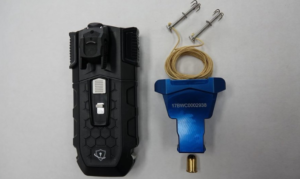
As calls to police departments about mental health issues continue to increase compared to just a few years ago, police have begun looking for new ways to safely subdue non-violent but agitated individuals. When escalated improperly, weapons can lead to injuries and death, and some feel that tazing or pepper spraying non-violent individuals crosses a line as well.
Safety of the officer is the top priority, but when police want to safely detain an agitated suspect, they don’t always have the right tool for the situation. Chaska police believe they may have found the solution with a device called the BolaWrap 100.
The BolaWrap 100
The BolaWrap 100 is a non-lethal incapacitation device that looks like something you might find on Batman’s utility belt. The device is a small tube that, with the push of a button, fires an 8-foot Kevlar tether at 640 feet per second. When aimed at a suspect’s feet, it will ensnare and entangle their legs with minimal pain and a low chance of any injury outside of a minor bruise.
“It didn’t hurt,” said Chaska Police Chief Scott Knight, who had the device shot at his feet to demonstrate its use. “It was sort of like a slap.”
Knight sees the device as a gamechanger for police. Many departments across Minnesota have revamped their deescalation programs as more mental health calls come in, but it will be great for police officers to have another tool that can help them safely subdue a subject without resorting to more extreme measures.
“The moment I saw this device, I knew that we needed to have it,” he said. “This is one of the biggest advancements I’ve seen in my 43-year career. I wish I’d had this tool when I was an officer.”
Knight reiterated that the device is not meant to take the place of a service weapon or taser, and that it is really only effective from within 25 feet, but it could provide useful for detaining individuals they believe are on drugs, hallucinogenics, or who are having a mental health episode.
Mike Rothans, COO of Wrap Technologies, said the device was designed by former officers after hearing the same complaint from families of individuals shot by police.
“They all said the same exact thing: ‘We called for help and you came out and shot my son,’?” he said. “It seems like we can do more — and we should do more.”
Each device costs $800 and deployment cartilages run about $30, but half a dozen units were paid for by a donation from local grocer Michael Foods, and the rest of the money to outfit Chaska officers will come from drug forfeiture funds, not from taxpayers.
It would not be surprising if these devices took off in Minnesota and across the nation. If they can save just one life while still keeping officers safe, they are worth the investment.





